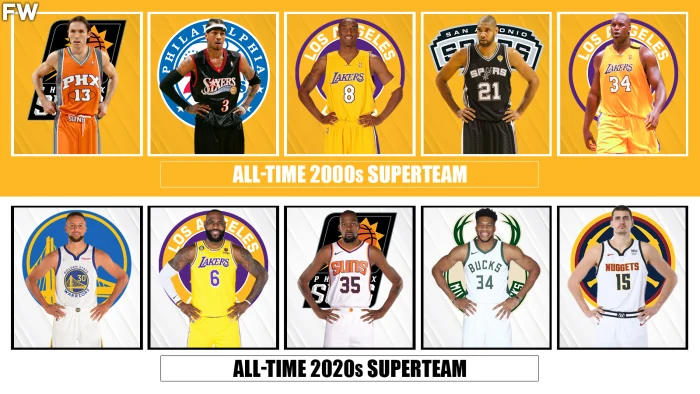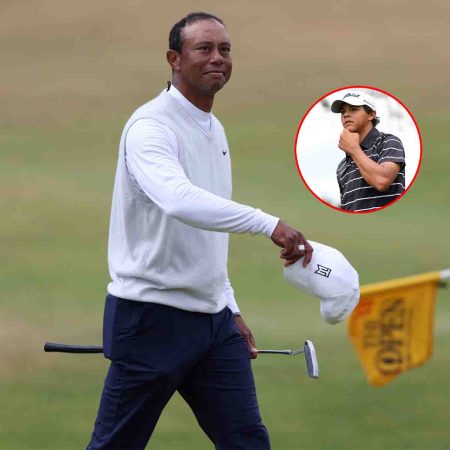It is time to place two dominant teams against each other in an iconic five-on-five matchup for all the marbles. We have already seen how a 2020s superteam featuring today’s elite stars went to battle against Michael Jordan and the 1990s superteam, falling short in 6 games. Each team had 5 superstars that dominated their respective eras against each other, but the 1990s stars had enough to come out on top thanks to clutch play and physical aggression. It is time to push the era another 10 years to place the 2000s superteam against the 2020s superteam. Can the 2020s stars find a way to win against the iconic 2000s stars?

The 2000s is considered the start of the “new age” with defense starting to get minimized and the next generation of stars coming in after Michael Jordan, including Kobe Bryant, Shaquille O’Neal, and Tim Duncan. All three stars won multiple titles in the decade, while others, such as Steve Nash and Allen Iverson, were elite guards that won MVP awards and led their teams to impressive success despite never winning a single NBA title between them. The 2000s era is filled with talent, but do they have enough to take care of business against the 2020s stars? Let’s find out by mentioning the rosters and the competitive matchup breakdown over a 7-game series.
Rosters
All-Time 2000s Superteam Starting Lineup: Steve Nash, Allen Iverson, Kobe Bryant, Tim Duncan, Shaquille O’Neal
All-Time 2020s Superteam Starting Lineup: Stephen Curry, LeBron James, Kevin Durant, Giannis Antetokounmpo, Nikola Jokic
By creating a best-of-7 series between both sides of superstar players, here is how the matchups and, eventually, the entire series pans out.
Steve Nash vs. Stephen Curry

Credit: Fadeaway World
Steve Nash was considered somewhat of a version of Stephen Curry because he shot a career 49.0% from the field, 42.8% from three, and 90.4% from the foul line. Nash was a greater playmaker than Steph, as he won two straight MVP awards because of that, but he was also an elite shooter. Nash is not much of a defender either, so his matchup will be amazing as he goes against Curry, a player with a similar playing style.
Stephen Curry is averaging 24.5 PPG on 47.5% shooting from the field, including 42.8% from three. Curry shoots 90.9% from the free-throw line over his career with the Warriors, and he certainly gets there a lot. Curry has an amazing ability to beat his defender off the dribble and gets his buckets at the rim when he isn’t nailing shots. This matchup will be somewhat even as both players have similar playing styles.
Allen Iverson vs. LeBron James

Credit: Fadeaway World
Allen Iverson will have a complete mismatch when he comes up against a 6’9”, 250-lb behemoth in LeBron James. Iverson is a professional scorer, after all, and will have no issue pushing the pace on the fast break and creating for himself or others. Allen will have to score mostly by coming off screens and relying on Nash to set him up because James is a physical force on both ends of the court.
Meanwhile, LeBron will handle playmaking duties to allow Steph to come off screens. James is very unselfish and will not mind taking a backseat offensively in favor of three other elite scorers. James will realize a smaller Allen Iverson will have to be on him at times and will use his size to post 27 PPG on 55% shooting in the series. Surprisingly, James will not be able to nail the three as he only shoots 31% from deep.
Kobe Bryant vs. Kevin Durant

Credit: Fadeaway World
The 2020s superteam has one of the most fierce competitors ever in Kobe Bryant and also a player who will raise his game alongside other superstar players. Bryant cannot be beaten one-on-one theoretically, but will that opinion manifest itself in the series? After all, there is only one basketball on the court, and Kobe will need to share the ball with his teammates. Instead of foreshadowing, let’s make it clear that Bryant will have a very strong series in the 7-game series for his side.
Kevin Durant is an easy choice as small forward because he is one of the top-5 scoring talents of all time. Against a team that has Nash, Iverson, Kobe, and Shaq, superstar offense is needed, and Durant fits the bill. He will have no issues getting his shots up over a shorter Bryant and will have a strong series in terms of scoring numbers and efficiency from the floor. The question is: can KD stop Kobe Bryant on the defensive end?
Tim Duncan vs. Giannis Antetokounmpo

Credit: Fadeaway World
Tim Duncan is the greatest power forward ever, and he will be one of the first choices on the chosen lineup to compete with The Greek Freak Giannis Antetokounmpo. Duncan is a natural post player and will use his physicality and basketball IQ to run the game inside alongside a dominant superstar in Shaquille O’Neal. Duncan doesn’t have Giannis’ athleticism, but he has the brain to be effective.
Giannis Antetokounmpo will have to use his athleticism against Duncan, who is always capable of recovering on defense and using his length and defensive IQ to contest shots. The Big Fundamental will rebound, block shots, and also be a passer from the post consistently over the seven games. The Greek Freak will do his thing on both ends but must put pressure on Duncan to be effective.
Shaquille O’Neal vs. Nikola Jokic
Credit: Fadeaway World
The most dominant physical force in the paint in this series, Shaquille O’Neal, will have his way with Nikola Jokic defending him. As great as Jokic is offensive, he will not be able to stop Shaq from dominating the court. He is the biggest player on the floor, standing 7’’1” and weighing 320 lbs. With Nash and the guards feeding him throughout the series, O’Neal will have a big series in terms of using his physicality inside.
Nikola Jokic is the greatest passing center ever and will have to rely on finesse against the bigger and stronger Shaq. The Serbian superstar will average 7 APG in the series to go along with 18 PPG and 10 RPG. Unfortunately, Jokic will rely on help from Giannis Antetokounmpo to help with Shaq because the center is simply too big and too strong. No doubt, Shaq wins this matchup.
2000s Superteam Advantages
The 2000s Superteam chosen to compete with the 2020s squad has elite scorers and defenders at their natural positions. Nash is the best at his position in terms of being the best floor general and leader on the court. Kobe is also the best perimeter scorer, and the big men down low are at the top of their positions on both ends.
The 2000s Superteam has the greatest power forward ever at his natural position and a top-3 center ever at his own natural position. Shaq is too strong and too dominant for Jokic or Giannis and will have the most impact in the series for his side. Assuming the rules allow Shaq to play his style just enough, there will be no answer.
2020s Superteam Advantages
The 2020s Superteam will have an unstoppable offense at times, with LeBron and Jokic running the point with Giannis pushing the pace alongside two all-time great shooters in Durant and Curry. It will be impossible to stop them when they are going because Curry and Durant can singlehandedly win games by themselves from the three-point line.
Giannis and Jokic are an elite duo in the modern NBA because they can do everything on offense and provide size to be deterrents on defense. Can they do enough to stop Shaquille O’Neal, however? That will be the key to the series because if they can’t find a way, they will struggle to make up what the opposition brings on both ends.
Who Wins A Best-Of-7 Series?
Game 1 is a blowout victory for the 2020s Superteam. Stephen Curry, Kevin Durant, and LeBron James all have incredible games by combining for 89 points. There is simply no stopping the trio as they take over and blitz the 2000s Superteam on both ends of the court. The hunger is in their eyes, and they win the game by a convincing margin, 109-90, with a whopping 25 three-pointers made versus only 6 three-pointers made by the 2020s Superteam.
The second game is much closer, as the 2000s Superteam bounces back thanks to a spectacular showing from Kobe Bryant and Shaquille O’Neal. The duo combine for 61 points and 21 rebounds, dominating the game from the perimeter and the interior. The game is tied at one point, 105-105, with 24 seconds left, giving the 2000s Superteam a chance to hold the ball for the last possession. Kobe attacks and finds Iverson, who uses his crossover to free himself and nail the game-winner.
Game 3 is neither a blowout nor a tight game, but the 2000s Superteam comes out on top rather convincingly with a 110-91 victory. The key is Shaquille O’Neal, the most dominant player in the NBA. The big man goes off for 39 points, and the pace of the game is manipulated by him on both ends of the court. The 2000s Superteam also benefits greatly from the 2020s Superteam going only 10-35 from the three-point line. With a 2-1 series lead, the 2020s Superteam is looking for a way back, and they find it through LeBron James.
Game 4 goes to LeBron James’ side, thanks to a spectacular performance from The King. James drops 40 points, including 6-10 from three, giving his team a massive boost when no one else truly finds their offense. In a rather low-scoring game, James is the brightest spot and keeps the series alive by shooting 51% from the field and chipping in 11 rebounds as well. The 2000s Superteam has to write this off because The King was in his bag all game long.
The 2000s Superteam answers in Game 5, winning the game 101-97. The King is at his efficient best, shooting 51% from the field and 80% from the free-throw line. But they can’t stop a balanced attack from the 2020s Superteam, as each player scores a minimum of 20 points. With such a balanced effort, the 2000s Superteam can’t do enough to truly make an impact. The stars must respond in Game 6, and they do, thanks to another blowout victory for them.
As expected, the 2020s Superteam puts forward a tremendous Game 6 performance. Curry scores 25 points on 6 threes, Durant goes 12-14 from the field, and Jokic notches a triple-double. But the star of the show is Giannis Antetokounmpo, who scores a game-high 40 points thanks to a mix of three-point shooting (2-5), free-throw shooting (6-8), and inside scoring (14-17 FG). The game finishes 121-93, as the 2020s Superteam simply clicks on all cylinders to force a pivotal Game 7 for the ages.
It comes down to Game 7, where either team can win the game and the series. The difference has to come to the fine details, something the 2020s Superteam cannot seem to do in this game. Shaquille O’Neal completely dominates inside, scoring 34 points and adding 18 rebounds, including 6 on the offensive end. Shaq also has 4 blocks in the game and goes quite efficiently from the line (10-15). The 2020s Superteam tries to foul Shaq as much as possible, but the big man is aware of it, and either spins for dunks or kicks out to the shooter. Bryant and Nash shoot a combined 47% from the field, which helps a ton, but Shaq is the difference because he is simply too big and too strong. The 2000s Superteam realizes the answer is down low, and O’Neal wins the Finals MVP as a result.
Final Result: 2000s Superteam vs. 2020s Superteam 4-3
Finals MVP: Shaquille O’Neal
Source: fadeawayworld








